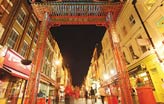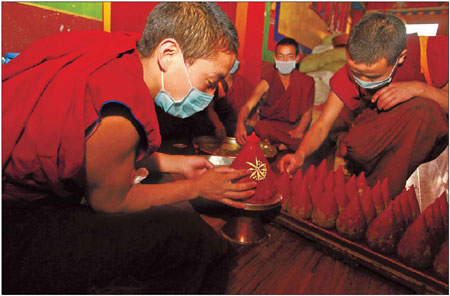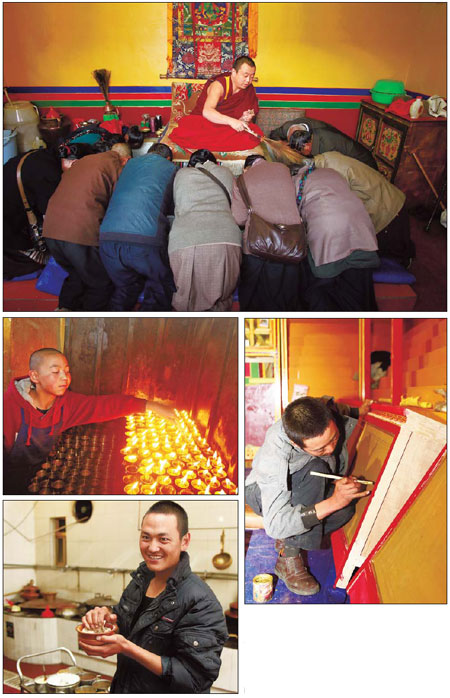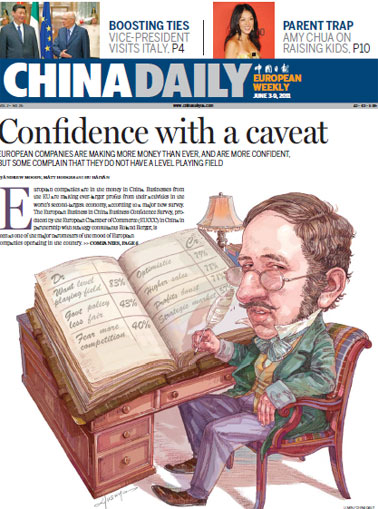Society
In the service of the gods
Updated: 2011-06-02 08:02
By Peng Yining (China Daily)
|
Gasi and other young monks in Kunde Ling monastery in Lhasa, capital of the Tibet autonomous region, prepare oblations made of tsampa. Photos by Feng Yongbin / China Daily |
|
Clockwise from top: Kunde Ling, one of Lhasa's former royal temples, attracts fl ows of pilgrims every day. Young monks are tasked with chores, such as repair work. Kelsang is in charge of cooking in the monastery. Penpa, the youngest monk in Kunde Ling, has to keep the monastery's 1,800 butter lamps lit. |
There is no TV, Internet or cell phone for the young lamas of Lhasa's Kunde Ling monastery. But there is a deep conviction that they are there for a higher purpose. Peng Yining reports.
Penpa is up at 6 am. Shivering in the icy morning winds in Lhasa, the 16-year-old lama cocoons himself in a baggy crimson sports sweater.
Having been in the Kunde Ling monastery for just fi ve months, Penpa is yet to earn himself a lama's traditional clothes.
One of Lhasa's four former royal temples, Kunde Ling is the city's best-kept secret. Its gleaming roofs are well hidden from the street and its entrance is protected from the hordes of tourists.
Of the monastery's 42 monks, 10 are in their late teens and early 20s. Th ey are tasked with most of the temple's chores. While the older lamas, wrapped in their red cloaks, sit crosslegged in the chapels, chanting the scriptures, the young lamas get busy with cooking and cleaning.
Penpa is Kunde Ling's youngest monk. His main task is to keep the monastery's 1,800 butter lamps lit from 6:30 am to 7 pm.
Losang, an offi cial involved in the management of Kunde Ling, says that in old Tibet, at least one son from every family became a monk as a mark of respect to the monastery. Sending a child to the monastery was also a way for poor families to give him a good start in life, Losang says.
As Tibet's economy improves, the number of Kunde Ling's monks has fallen to 42 from 80 in the 1990s.
Penpa says he became a monk partly because his family is too poor to aff ord schooling for both him and his 18-year-old brother.
Every night, aft er completing all his chores, he gets about two hours to study the scriptures before going to bed at 10 pm. "I like chanting the scriptures, although I do not understand them fully," he laughs.
Lama Kelsang, 21, came to Kunde Ling in 2005 when his sick parents died. He still has the English textbook that he once used in school, and occasionally goes through it. "Maybe someday I can use them," he says.
Along with four other young monks, he is in charge of cooking. Every morning around 10, aft er serving all monks with tsampa (roasted fl our) and butter tea, Kelsang will ascend the monastery's roof to strike a gong, signaling to senior lamas to start their prayers.
Th e older Lamas will then stroll out of their dormitories, located around the chapel, and head to the dark main shrine, leaving the young monks to work outside.
Tenzin, 17, is preparing the oblations of tsampa. He shapes the fl our into little pagoda-like fi gurines and paints them red. He is soon joined by other young monks.
Th ey all sit in a circle on the fl oor and solidify the yak butter that will be used on the little tsampa pagodas.
The monastery has no television, Internet or cell phone. Th ere are no books or magazines, except religious texts. Monks are not allowed to leave the temple without permission.
Gasi, 18, is decorating the pagodas with butter, when his friend Trinley, 20, gives him a playful nudge, messing up the butter petals. Th ey both collapse giggling, like little children, and are admonished by Phuntsog Tengye, a 50-year-old lama. He tells them to work quietly, at which Trinley rolls his eyes and the others snigger.
Tengye came to Kunde Ling when he was 19. Now he reads the scriptures from 6:30 am to 7:30 pm, in the dim light of butter lamps in front of a statue of the Avalokitesvara Buddha.
Most monks enter the monasteries as children. For the fi rst several years, they have to serve their teachers. Th e intelligent ones learn the scriptures and are allowed to take the examinations. Th e successful ones are appointed to high offi ces in the monastery. Th e rest will continue to perform the daily chores.
"Every year, Kunde Ling sends us to Potala Palace, Jokhang Temple or temples in Xigaze prefecture to meet eminent lamas and living Buddhas, and learn from them," Trinley says. "I respect them deeply and hope someday I will be a great lama like them. It is my honor to serve the gods."
E-paper

Tapping into the future
Foreign companies are investing in China's water industry as many predict a growing profit margin.
Preview of the coming issue
Headhunters ride on growth
Commercial property rides wave
Specials

Cuisine central
London's Chinatown is helping diners appreciate full palate of Chinese food

Tying the knot
Danish couple's high-end macrame export business takes off in the mountains of Yunnan.

Truly a super woman
Li Yuchun first came to prominence in 2005 as the Super Girl winner, and since then has become an international star.


